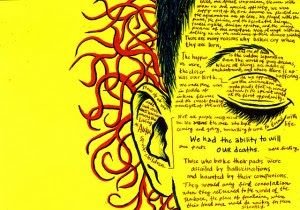Grade 12 English Unit 1: Critical Thinking (with Grammar Solutions)- Language Development
Know Thyself
A. Find the words from the text that match with the following meanings.
a. Shuffle ...walking by dragging one's feet along or without lifting them fully from the ground
b. Doodle... drawing pictures or patterns while thinking about something else
c. Plaque... a piece of flat metal with writing on it
d. Percepts… a general rule intended to regulate behaviour or thought
e. Sneaky... move or go in a furtive or stealthy way
B. Consult your teacher and define the following thinking skills.
a. convergent thinking
Convergent Thinking seeks only one correct answer to a problem or a specific situation. It does not need creativity to be able to find solutions, instead, logic and reflection are necessary to find answers to the resolution of conflicts that a person has. In Convergent Thinking, there are no possibilities and different options. Reflecting and carrying out a single answer is what is important
b. divergent thinking
Divergent thinking also referred to as lateral thinking, is the process of creating multiple, unique ideas or solutions related to a problem that you are trying to solve. Divergent thinking is similar to brainstorming in that it involves coming up with many different ideas to solve a single problem. Many tests that are used to measure creativity, such as the alternative uses test and incomplete figure test, have been found to measure divergent thinking.
c. critical thinking
Critical thinking has been described as an ability to question; to acknowledge and test previously held assumptions; to recognize ambiguity; to examine, interpret, evaluate, reason, and reflect; to make informed judgments and decisions; and to clarify, articulate, and justify positions
d. creative thinking
Creative thinking is the ability to look at things differently and find new ways of solving problems. It is the ability to consider something in a new way.
Grammar
Question tag
Study the following
Neg-Positive & vice versa
Auxiliaries repeated in tag except (Used to= din’t)
I am……, aren’t I? I am not…………. am I?
V1- do, V2- did, V5-does
Let us/me/her………will you? Lets+v1….Shall we?
All imperative ( both positive &Neg) will you?
Seldom, never, barely, hardly, no one, non of …
Nobody –Neg, put tag positive
There is…….isn't there?
Somebody, everybody, no one, everyone, …..they?
Something, nothing, everything, …………it
What is question tags
and what is it used for?
A question tag is a short question at the end of a sentence using the following form:
(Sentence), auxiliary verb+subject?
We use a question tag for
1. Asking someone to agree with us
e.g. today is extremely cold, isn't it?
2. Checking if something is true
e.g. you're Hari's brother, aren't you?
Rules
- If the statement is negative, the tag must be positive. If the statement is positive the tag must be negative.
- The tense of the auxiliary/modal verb of the statement that precedes it determines the tense of the tag. If the statement does not use an auxiliary/modal (i.e. it is in the present or past simple tense), then the auxiliary to do must be used.
- He comes from the US, doesn't he?
A. Study the following examples.
a. You are tired, aren’t you?
b. He left Kathmandu, didn’t he?
c. Your father never touched alcoholic drinks, did he?
B. Rewrite the following sentences adding appropriate question tags.
a. Gill does not know Ann,………?
b. I’m very patient,…….?
c. They’d never met me before,……?
d. Listen carefully,…….?
e. Let’s have a break,…….?
f. Let us invite them,……..?
g. Hari used to live in France as a boy, ……?
h. You’d better not take a hard drink,…..?
i. Sheep eat grass,…?
j. Mr. Pande can speak nine languages, ………….?
k. She’s finished her classes, ………………?
l. She barely managed to reach the goal,……….?
m. Don’t let him swim in that pond, ……….?
n. There are lots of people here,…………..?
C. Read the following situations. What do you say in these situations? Use question tags.
a. The sky is full of clouds. You can see lightning and hear thunder. It’s going to rain soon, ……,…….?
b. You want to pay the taxi fare but you are short by 100 rupees. Shyam, you ……,…….?
c. You have met a stranger at a party and you want to have a chat with him/her. ……,…….?
d. You came out of the film hall with your friend. You enjoyed the film. The film..........,……………?
e. You and your friend listened to a comedian on the stage and felt spellbound by his/her performance. He gave an excellent ………………………, ………………..?
f. You think your friend’s father has arrived from the US but you are not sure. Your father…….....,………?
g. You think Susan will join the new job tomorrow but you are not sure Susan………, …………….?
h. Your friend’s hair looks too short. You have got …………………………….,, ………………?
i. You want to go for a picnic with your friends in class. Let’s ………………………., …………….?
j. You want permission from your father to go for a walk. Let……………………, …………………..?
B. Answer Key
a. does he?
b. aren't I?
c. had they?
d. will you?
e. shall we?
f. Will you?
g. didn't he?
h. had you?
i. don't they?
j. can't he?
k. hasn't she?
l. did she?
m. Will you?
n. aren't there?
C. Answer Key
a. isn't it?
b. must pay 100rs, mustn't you? or you can pay, can't you?
c. We have never met before, Have we?
d. The film was very interesting, wasn't it?
e. He gave an excellent performance, didn't he?
f. Your father has arrived from the US, hasn't he?
g. Susan is going to join a new job tomorrow, isn't she?
h. You have got too short hair, haven't you?
i. Let’s go picnic with classmates, shall we?
j. Let me go out for a walk, will you?





Comments
Post a Comment